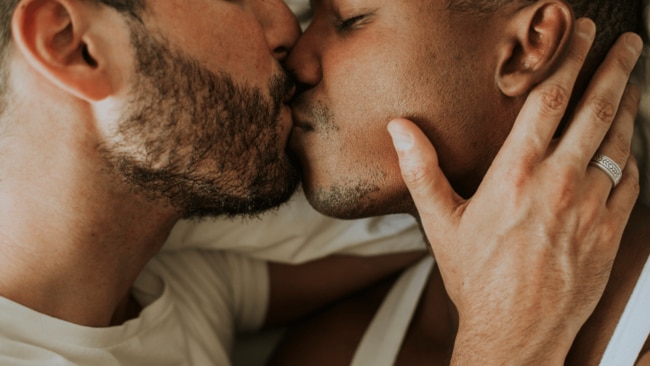Scientists say being in love 'scrambles' your brain and this is why
It gives new meaning to 'head over heels'

Lifestyle
Don't miss out on the headlines from Lifestyle. Followed categories will be added to My News.
Ever wondered why your entire mind takes a hit when you fall totally, head over heels in love? Australian researchers have identified the cause of this change, and why it's not just our emotions that respond to love, but our cognition and behaviours too.
The early throes of love are a heady time.
A once balanced and steady mind can quickly become turbulent and wanting, a rational thinker can steadily lose their sense of logic and an otherwise non-anxious person may find themselves opening and reopening their phones, just to check for a smidgen of contact.
It’s mind-boggling, and while almost every person is lucky enough to experience love in some form or another, none of us can ever truly rationalise it.
Love, in some form, is at the heart of virtually every film, song, play and novel. Writers, directors and actors have and do dedicate years of their lives trying to do justice to the intoxicating, infuriating throw of emotions and fairly represent the truth of the simple but all-encompassing matter of being in love.
The science on the matter, too, only goes so far – but some researchers are making great headway.
Like what you see? Sign up to our bodyandsoul.com.au newsletter for more stories like this.
The love report
In a new study, scientists have measured how a part of the brain is responsible for making us go truly head over heels.
Led by a team of researchers from the Australian National University, University of Canberra and University of South Australia, the world-first investigation examined the link between the brain’s behavioural activation system (BAS) and romantic love.
The study examined 1556 young adults who claimed they were ‘in love’, asking them questions “focused on the emotional reaction to their partner, their behaviour around them, and the focus they placed on their loved one above all else.”
Their findings? When we’re in love, our brains behave in a totally different way, making the focus of our love the centre of our entire lives.

Romantic love and the behavioural activation system
As we know, positive new relationships of any form release a cocktail of hormones into the blood, including oxytocin, commonly called the love hormone, and dopamine, the pleasure hormone.
Thanks to those hormones, when the BAS is firing it also contributes to “motor activity, energy, confidence, interest, pleasure in rewards, and, potentially, sociability and exploration,” along with pleasure itself.
What the report found is that there’s a further link between the BAS firing and the way we not only feel, but think and behave when we’re in love.
University of Canberra academic and UniSA Adjunct Associate Professor, Dr Phil Kavanagh, says the study shows that romantic love is linked to changes in behaviour as well as emotion.
“We know the role that oxytocin plays in romantic love, because we get waves of it circulating throughout our nervous system and bloodstream when we interact with loved ones,” says co-author, University of Canberra academic and UniSA Adjunct Associate Professor, Dr Phil Kavanagh.
“The way that loved ones take on special importance, however, is due to oxytocin combining with dopamine, a chemical that our brain releases during romantic love. Essentially, love activates pathways in the brain associated with positive feelings.”

Love at the centre of life
“Cognitive activity of romantic love includes intrusive thinking or preoccupation with the partner, idealisation of the other in the relationship, and desire to know the other and to be known,” reads the study.
“Emotional activity includes attraction to the other, especially sexual attraction, negative feelings when things go awry, longing for reciprocity, desire for complete union, and physiological arousal.
“Behavioural activity includes actions toward determining the other’s feelings, studying the other person, service to the other, and maintaining physical closeness.”
If you’ve been in love, you’ll know the feeling. When you’re infatuated with someone, you subconsciously begin to consider their opinions, feelings and proximity almost every time you make a decision. ‘Will they like this shirt I’m wearing?’, ‘Should I cancel my gym class in case they stay over?’, ‘I’ll be sure to buy that at the supermarket because it’s their favourite’.
Without realising, a person can become the centre of your entire universe.

The significance of the findings
ANU lead researcher and PhD student Adam Bode says the study, which was recently published in the journal Behavioural Sciences – sheds light on the mechanisms that cause romantic love.
“We actually know very little about the evolution of romantic love,” he says, thus every additional link is an important part of the puzzle.
The result of this study’s findings – that the BAS fires when a person is in love, changing the way we behave – is that “we develop a means of assessing BAS sensitivity to a loved one and assess its association with the intensity of romantic love.”
In addition, the team plans to commence research into “the differences between men and women in their approach to love, and a worldwide survey identifying four different types of romantic lovers” – the results of which we anxiously await.
More Coverage
Originally published as Scientists say being in love 'scrambles' your brain and this is why





